In the Swiss National Park
National park ranger Not Armon Willy
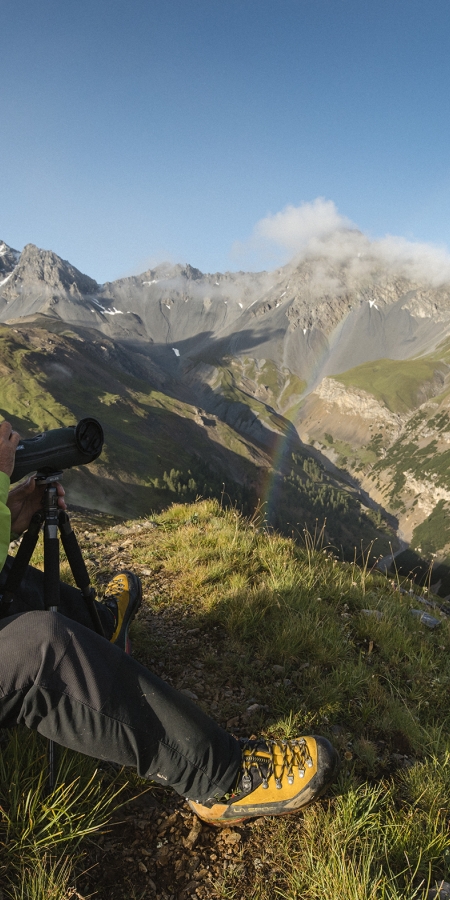
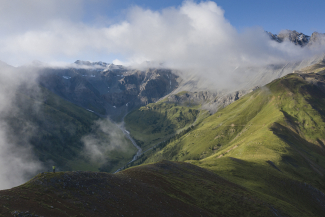
Magical moments to yourself
Not Armon has set out in the dark to stand at dawn on his observation post, Mot Tavrü. He loves those magical moments when the first rays of sunlight illuminate the mountain slopes. «Most wildlife is most active early in the morning and late in the evening, which is when you can count them best,» the experienced park ranger knows.
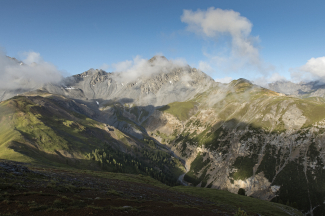
Nothing but wilderness – for more than 100 years
Mot Tavrü is located on the border of the National Park. While cows still graze on the left, untouched nature unfolds on the right. The Swiss National Park was founded in 1914 as the first national park in the Alps. The data series of the game counts therefore go back a long way, which is unique and particularly valuable for research.
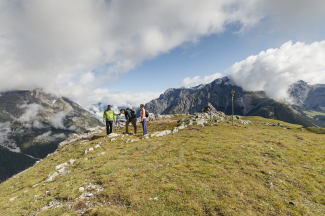
Do not forget binoculars
Park rangers don't just count animals, they also maintain trails, help with research projects, and are points of contact for park visitors. When Not Armon meets hikers, he likes to show them where deer are hiding. «If you want to observe wildlife, you have to bring a good pair of binoculars and a lot of time. Because the deer don't just walk by, they have to be tracked down the slopes.»
Inspiration and information in Zernez
The National Park Center is located in Zernez and is open all year round. Visitors can get all the information they need about the national park here, find inspiration for their next hike in exhibitions or book a guided hike. The park rangers also travel regularly to Zernez to bring their data sheets to their fellow researchers.
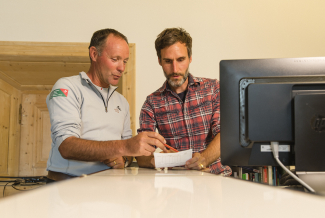
Seven national park rangers
Not Armon Willy has been a park ranger for 24 years. He is one of seven and the only one without a trade. As a trained postal worker, he does more administrative work than his colleagues. Like all national park rangers, he has successfully completed training as a gamekeeper and passed the hunting exam.
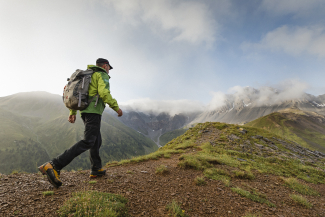
The privilege of leaving the trail
What he likes about his job is the peace and quiet of wild nature and the privilege of being able to move freely within it. All others are forbidden to leave the trails in the strictly protected national park. Even making fire, bathing in lakes or carrying dogs is forbidden. Not even a stone may be taken home, and park rangers are empowered to punish offenders. But he rarely has to do that, Not Armon is pleased to say. «Visitors respect and appreciate the protective regulations.»
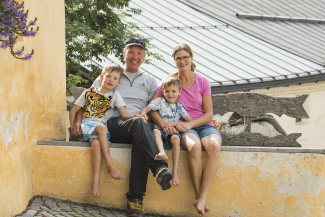
In the right place at the right time
In summer, the family man is out and about in the park practically every day, usually alone. He enjoys spending time with his family all the more. Not Armon lives in Guarda with his wife and two sons. In winter, when the national park is dormant, he is often at home sorting photos and doing office work. «National park guard is my absolute dream job. I was lucky; when I applied, I was in the right place at the right time.»
Text Franco Furger / Pictures Filip Zuan / Video ON AIR Production
Facts and figures about the National Park
- Goals: protect, research, inform
- Foundation: August 1, 1914
- Surface: 170,3 km2
- Altitude: 1400 - 3174 m (Piz Pisoc)
- Municipalities: Zernez, Scuol, S-chanf, Val Müstair
- Hiking trails: 21 routes, a total of 100 km, 18 rest areas
- Overnight stay: Chamanna Cluoza, Hotel Parc Naziunal Il Fuorn
- Structure: 28 % forest, 21 % alpine mats, 51 % rock, scree
- Rock: 80 % dolomite and limestone
- Mammals: 36 species
- Birds: 100 species, of which 60 are breeding birds
- Invertebrates: 5000 species
- Higher plants: 650 species
In winter, the Swiss National Park is closed to visitors.


